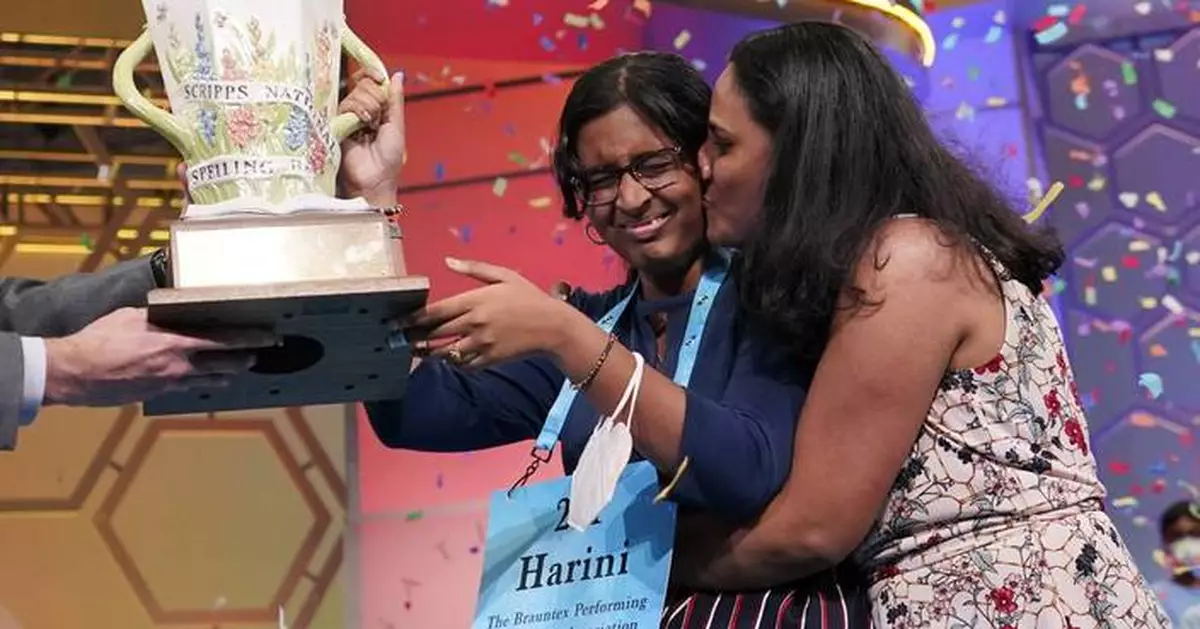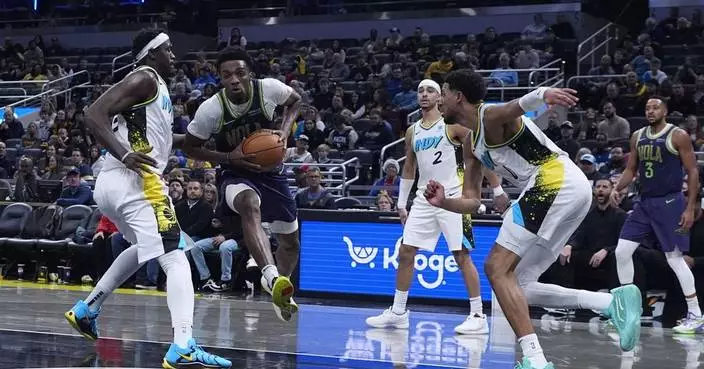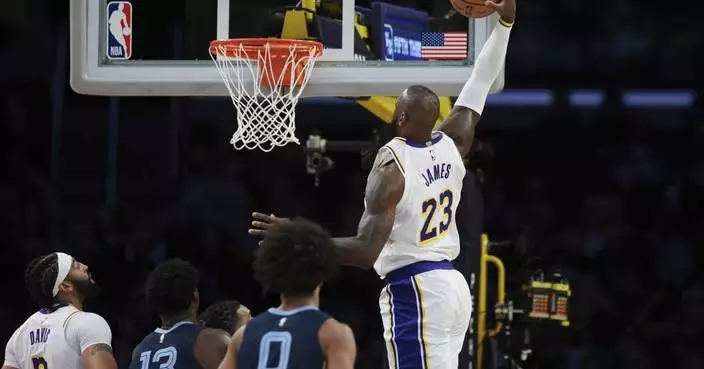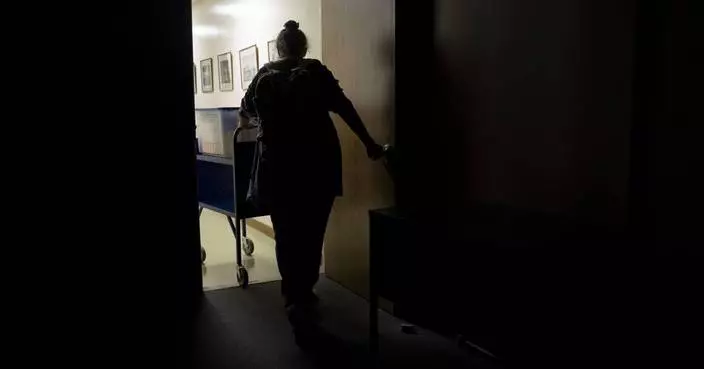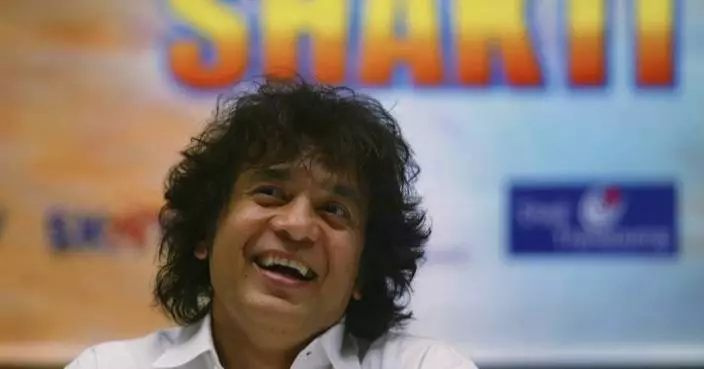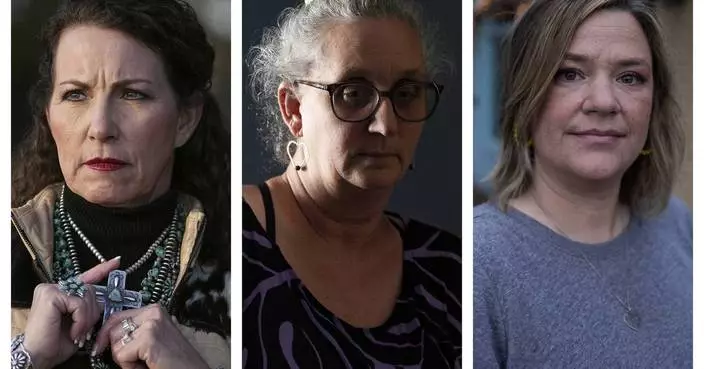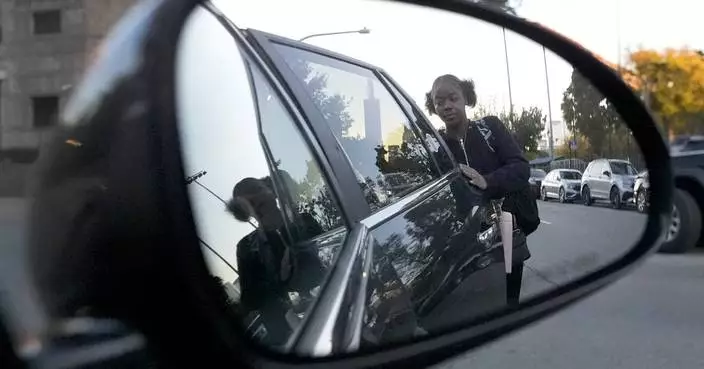When Balu Natarajan became the first Indian American champion of the Scripps National Spelling Bee in 1985, a headline on an Associated Press article read, “Immigrants’ son wins National Spelling Bee,” with the first paragraph noting the champion “speaks his parents’ native Indian language at home.”
Those details would hardly be newsworthy today after a quarter-century of Indian American spelling champs, most of them the offspring of parents who arrived in the United States on student or work visas.
Click to Gallery
FILE - Dev Shah, 14, from Largo, Fla., competes during the finals of the Scripps National Spelling Bee, Thursday, June 1, 2023, in Oxon Hill, Md. Since 1999, 28 of the last 34 Scripps National Spelling bee champions have been Indian American. The experiences of first-generation Indian Americans and their spelling bee champion children illustrate the economic success and cultural impact of the nation’s second-largest immigrant group. (AP Photo/Nathan Howard, File)
FILE - Balu Natarajan, an 8th grade student at Jefferson Junior High School in Woodbridge, Ill., holds his trophy with the aid of William R. Burleigh, vice president of Scripps Howard Newspapers, sponsor of the National Spelling Bee, after he won the competition in Washington, on June 6, 1985. Since 1999, 28 of the last 34 Scripps National Spelling bee champions have been Indian American. And most of those winners are the offspring of parents who arrived in the United States on student or work visas. The experiences of first-generation Indian Americans and their spelling bee champion children illustrate the economic success and cultural impact of the nation’s second-largest immigrant group. (AP Photo/Bob Daugherty, File)
FILE - Dr. Balu Natarajan, right, from Hinsdale, Ill., poses for a photograph with his son Atman Balakrishnan, 12, at the Scripps National Spelling Bee, Tuesday, May 29, 2018, in Oxon Hill, Md. Since 1999, 28 of the last 34 Scripps National Spelling bee champions have been Indian American. And most of those winners are the offspring of parents who arrived in the United States on student or work visas. The experiences of first-generation Indian Americans and their spelling bee champion children illustrate the economic success and cultural impact of the nation’s second-largest immigrant group. (AP Photo/Alex Brandon, File)
FILE - Ishika Varipilli, 11, from Spring, Texas, waits on stage during the Scripps National Spelling Bee, Wednesday, June 1, 2022, in Oxon Hill, Md. Since 1999, 28 of the last 34 Scripps National Spelling bee champions have been Indian American. The experiences of first-generation Indian Americans and their spelling bee champion children illustrate the economic success and cultural impact of the nation’s second-largest immigrant group. (AP Photo/Andrew Harnik, File)
FILE - Harini Logan, 14, from San Antonio, Texas, gets a kiss from her mom Rampriya Logan on stage as she celebrates winning the Scripps National Spelling Bee, Thursday, June 2, 2022, in Oxon Hill, Md. Since 1999, 28 of the last 34 Scripps National Spelling bee champions have been Indian American. The experiences of first-generation Indian Americans and their spelling bee champion children illustrate the economic success and cultural impact of the nation’s second-largest immigrant group. (AP Photo/Alex Brandon, File)
FILE - Dev Shah, 14, from Largo, Fla., competes during the finals of the Scripps National Spelling Bee, Thursday, June 1, 2023, in Oxon Hill, Md. Since 1999, 28 of the last 34 Scripps National Spelling bee champions have been Indian American. The experiences of first-generation Indian Americans and their spelling bee champion children illustrate the economic success and cultural impact of the nation’s second-largest immigrant group. (AP Photo/Nathan Howard, File)
FILE - Balu Natarajan, an 8th grade student at Jefferson Junior High School in Woodbridge, Ill., holds his trophy with the aid of William R. Burleigh, vice president of Scripps Howard Newspapers, sponsor of the National Spelling Bee, after he won the competition in Washington, on June 6, 1985. Since 1999, 28 of the last 34 Scripps National Spelling bee champions have been Indian American. And most of those winners are the offspring of parents who arrived in the United States on student or work visas. The experiences of first-generation Indian Americans and their spelling bee champion children illustrate the economic success and cultural impact of the nation’s second-largest immigrant group. (AP Photo/Bob Daugherty, File)
FILE - Dr. Balu Natarajan, right, from Hinsdale, Ill., poses for a photograph with his son Atman Balakrishnan, 12, at the Scripps National Spelling Bee, Tuesday, May 29, 2018, in Oxon Hill, Md. Since 1999, 28 of the last 34 Scripps National Spelling bee champions have been Indian American. And most of those winners are the offspring of parents who arrived in the United States on student or work visas. The experiences of first-generation Indian Americans and their spelling bee champion children illustrate the economic success and cultural impact of the nation’s second-largest immigrant group. (AP Photo/Alex Brandon, File)
FILE - Ishika Varipilli, 11, from Spring, Texas, waits on stage during the Scripps National Spelling Bee, Wednesday, June 1, 2022, in Oxon Hill, Md. Since 1999, 28 of the last 34 Scripps National Spelling bee champions have been Indian American. The experiences of first-generation Indian Americans and their spelling bee champion children illustrate the economic success and cultural impact of the nation’s second-largest immigrant group. (AP Photo/Andrew Harnik, File)
FILE - Harini Logan, 14, from San Antonio, Texas, gets a kiss from her mom Rampriya Logan on stage as she celebrates winning the Scripps National Spelling Bee, Thursday, June 2, 2022, in Oxon Hill, Md. Since 1999, 28 of the last 34 Scripps National Spelling bee champions have been Indian American. The experiences of first-generation Indian Americans and their spelling bee champion children illustrate the economic success and cultural impact of the nation’s second-largest immigrant group. (AP Photo/Alex Brandon, File)
This year's bee is scheduled to begin Tuesday at a convention center outside Washington and, as usual, many of the expected contenders are Indian American, including Shradha Rachamreddy, Aryan Khedkar, Bruhat Soma and Ishika Varipilli.
Nearly 70% of Indian-born U.S. residents arrived after 2000, according to census data, and that dovetails with the surge in Indian American spelling bee champions. There were two Indian American Scripps winners before 1999. Of the 34 since, 28 have been Indian American, including three straight years of Indian American co-champions and one year (2019) when eight champions were declared, seven of Indian ancestry.
The experiences of first-generation Indian Americans and their spelling bee champion children illustrate the economic success and cultural impact of the nation's second-largest immigrant group.
As of 2022, there were 3.1 million Indian-born people living in the U.S., and Indian American households had a median income of $147,000, more than twice the median income of all U.S. households, according to census data. Indian Americans also were more than twice as likely to have college degrees.
Indians received 74% of the H-1B visas for specialized occupations approved in fiscal 2021, and a record total of nearly 269,000 students from India were enrolled at U.S. colleges and universities in 2022-23, according to the Institute of International Education.
Those numbers paint a picture of a high-achieving demographic that is well-suited for success in academic competitions.
Ganesh Dasari, whose daughter and son each made multiple appearances at the Scripps bee, holds a doctorate in civil engineering from the University of Cambridge and was recruited to the U.S. to work for ExxonMobil on an H-1B visa. He quickly obtained a green card.
“Me and my wife, we came from a similar background. We both benefited from having the education ... so we put a lot of emphasis on educating our kids,” Dasari said. “We basically introduced them to anything academic, and a couple of sports, but clearly there was a bias in our thinking that education is a higher priority than sports.”
In his 2016 address to Congress, Indian Prime Minister Narendra Modi mentioned “spelling bee champions” among his country's contributions to the U.S. while that year's co-champs, Nihar Janga and Jairam Hathwar, watched from the gallery.
Even among Indian American spellers, a particular subgroup is overrepresented: families from the southern states of Andhra Pradesh and Telangana, where Telugu is the primary language. Hyderabad, the capital of Telangana, is India's information-technology hub and the region supplies many H-1B visa recipients.
“Whenever we go to the spelling bee events, everybody speaks that language,” Dasari said. “We realized there are so many people from the same state.”
Deval Shah, the father of last year's champion, Dev Shah, grew up in the northwestern state of Gujarat and proudly noted Dev was the first spelling bee champion of Gujarati descent. The parents of the 2022 winner, Harini Logan, are from Chennai in the southern Indian state of Tamil Nadu. Shah is an engineer, his wife is a physician, and both of Harini's parents were trained as software engineers.
Indian-born parents of kids with an affinity for spelling have a network of similar families to provide guidance and support, as well as access to organizations like the North South Foundation, which offers academic competitions aimed at the Indian diaspora.
“The reason Indian American immigrants really dominate, the main reason is the North South Foundation,” Shah said.
When Harini won her first NSF spelling competition, Ganesh Dasari was one of the judges, and “he was literally chasing us down” to tell them “Harini has tremendous potential to be on the national stage,” said Rampriya Logan, Harini's mother.
Ishika, a 13-year-old from Spring, Texas, who will be competing at Scripps this year for the third time, woke her parents at 6 a.m. the day after she lost a third-grade classroom spelling bee, saying she wanted to participate in more bees. Her mother, an IT manager who immigrated to the U.S. in 2006, then reached out to ask advice from other families from the Houston area whose children were high-level spellers.
The relative wealth and stability of Indian American households could lead observers to conclude their children are benefiting primarily from a privileged upbringing. The truth is more nuanced, said Devesh Kapur, a professor of South Asian Studies at Johns Hopkins University and a co-author of “The Other One Percent: Indians in America.”
“It is important to note that the children participating in the spelling bee competition come from striving middle-class immigrant families, often in occupations like IT, and not from wealthier Indian American households in finance or tech start-ups or consulting,” Kapur said.
Natarajan, a Chicago-based physician and health care executive, now serves as the volunteer president of the NSF, and he experienced the spelling bee as a parent when his son, Atman Balakrishnan, competed. He said he sometimes feels out of place because he was born in the U.S. and he admires the grit of Indian-born parents and their children.
“It’s hard to describe, but it’s a very specific mindset that just drives effort and in many ways drives outcomes and sustainable success,” Natarajan said.
Ben Nuckols has covered the Scripps National Spelling Bee since 2012. Follow him at https://x.com/APBenNuckols
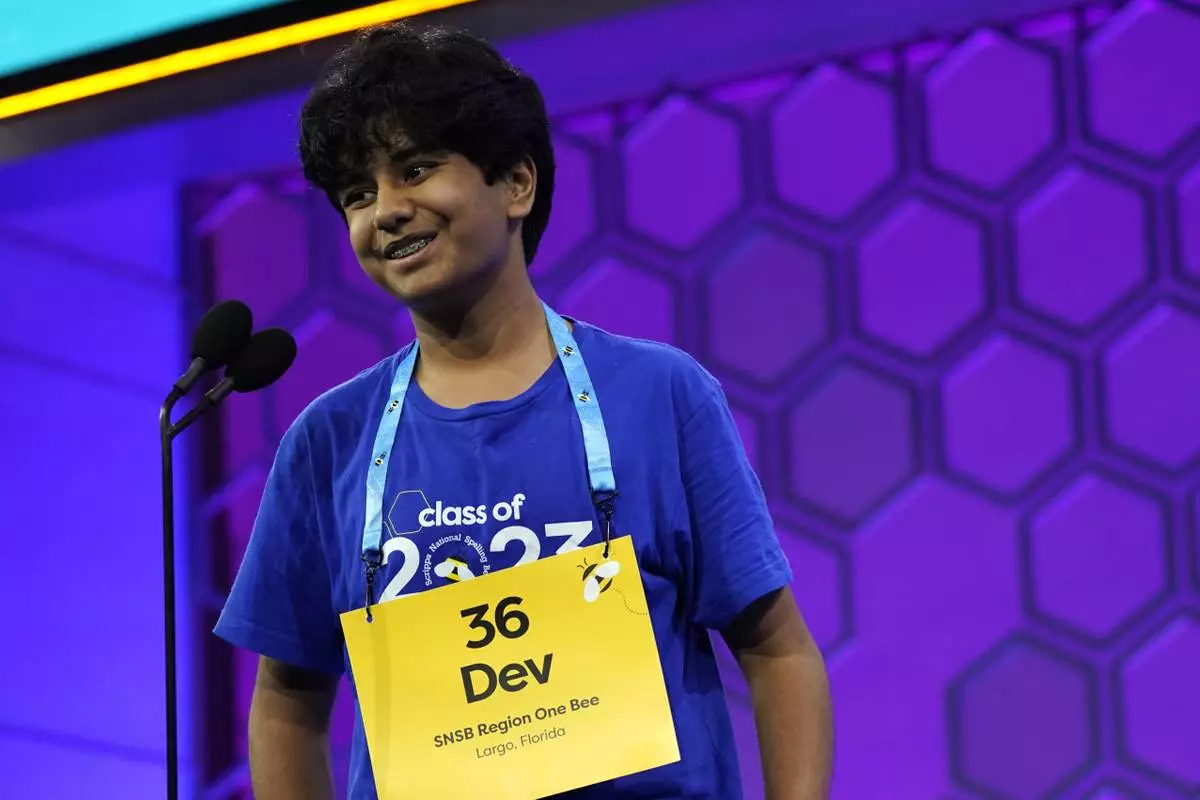
FILE - Dev Shah, 14, from Largo, Fla., competes during the finals of the Scripps National Spelling Bee, Thursday, June 1, 2023, in Oxon Hill, Md. Since 1999, 28 of the last 34 Scripps National Spelling bee champions have been Indian American. The experiences of first-generation Indian Americans and their spelling bee champion children illustrate the economic success and cultural impact of the nation’s second-largest immigrant group. (AP Photo/Nathan Howard, File)
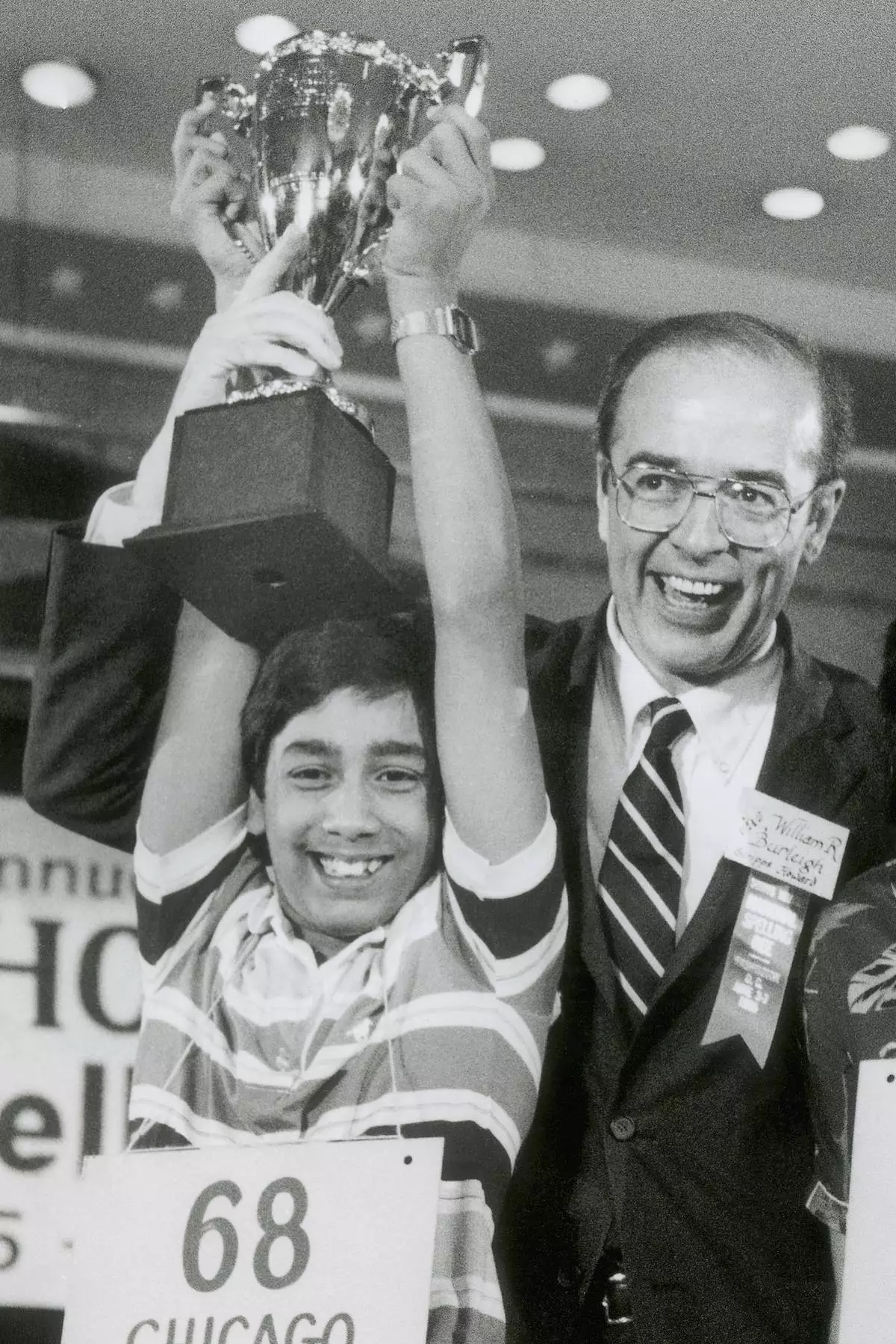
FILE - Balu Natarajan, an 8th grade student at Jefferson Junior High School in Woodbridge, Ill., holds his trophy with the aid of William R. Burleigh, vice president of Scripps Howard Newspapers, sponsor of the National Spelling Bee, after he won the competition in Washington, on June 6, 1985. Since 1999, 28 of the last 34 Scripps National Spelling bee champions have been Indian American. And most of those winners are the offspring of parents who arrived in the United States on student or work visas. The experiences of first-generation Indian Americans and their spelling bee champion children illustrate the economic success and cultural impact of the nation’s second-largest immigrant group. (AP Photo/Bob Daugherty, File)
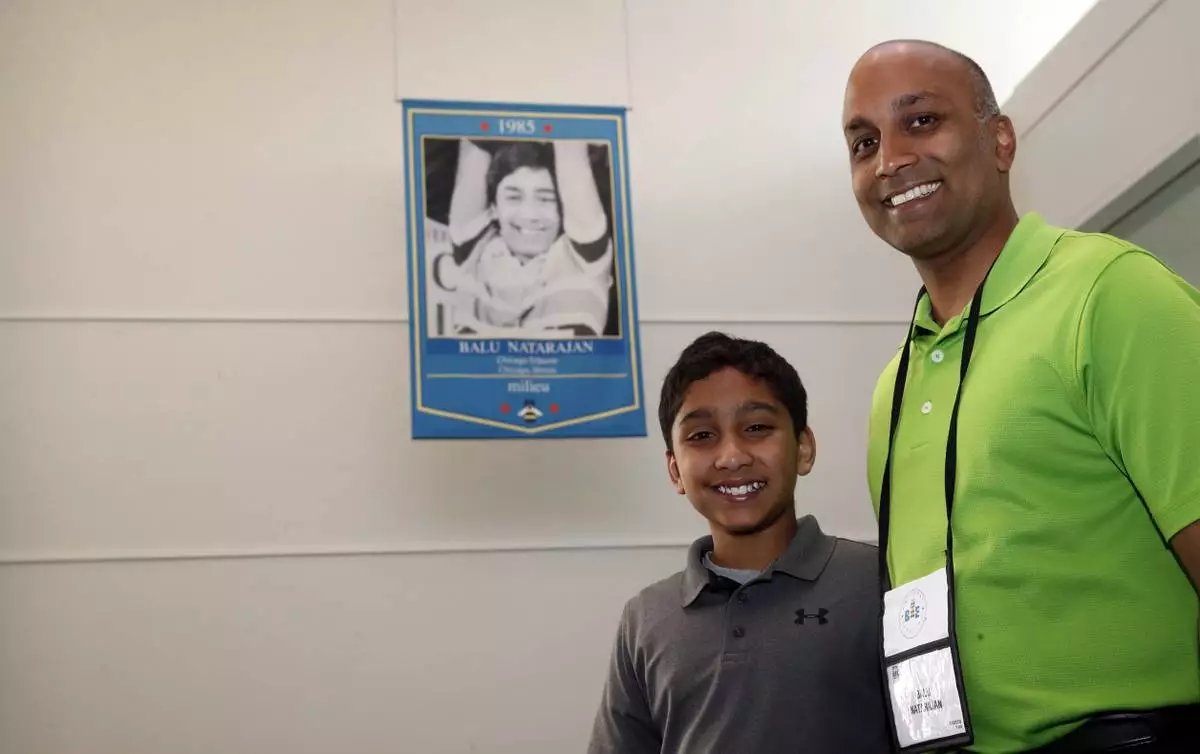
FILE - Dr. Balu Natarajan, right, from Hinsdale, Ill., poses for a photograph with his son Atman Balakrishnan, 12, at the Scripps National Spelling Bee, Tuesday, May 29, 2018, in Oxon Hill, Md. Since 1999, 28 of the last 34 Scripps National Spelling bee champions have been Indian American. And most of those winners are the offspring of parents who arrived in the United States on student or work visas. The experiences of first-generation Indian Americans and their spelling bee champion children illustrate the economic success and cultural impact of the nation’s second-largest immigrant group. (AP Photo/Alex Brandon, File)
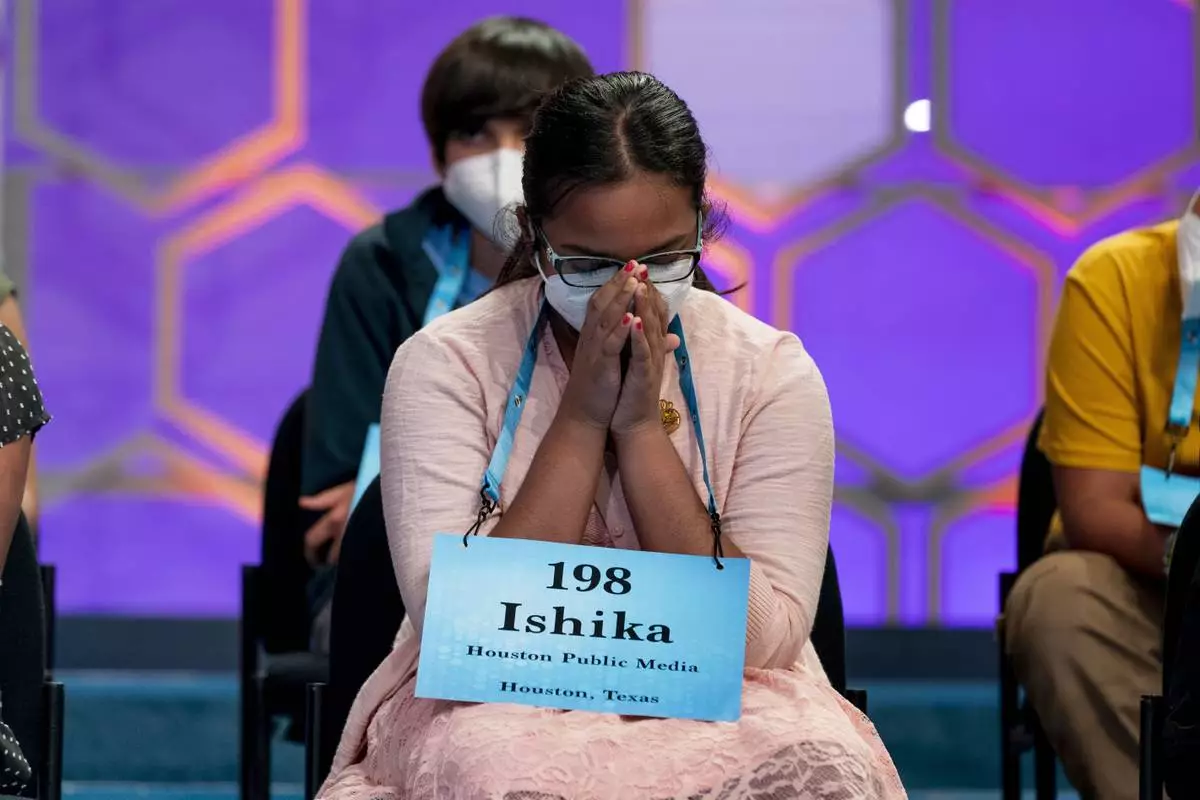
FILE - Ishika Varipilli, 11, from Spring, Texas, waits on stage during the Scripps National Spelling Bee, Wednesday, June 1, 2022, in Oxon Hill, Md. Since 1999, 28 of the last 34 Scripps National Spelling bee champions have been Indian American. The experiences of first-generation Indian Americans and their spelling bee champion children illustrate the economic success and cultural impact of the nation’s second-largest immigrant group. (AP Photo/Andrew Harnik, File)
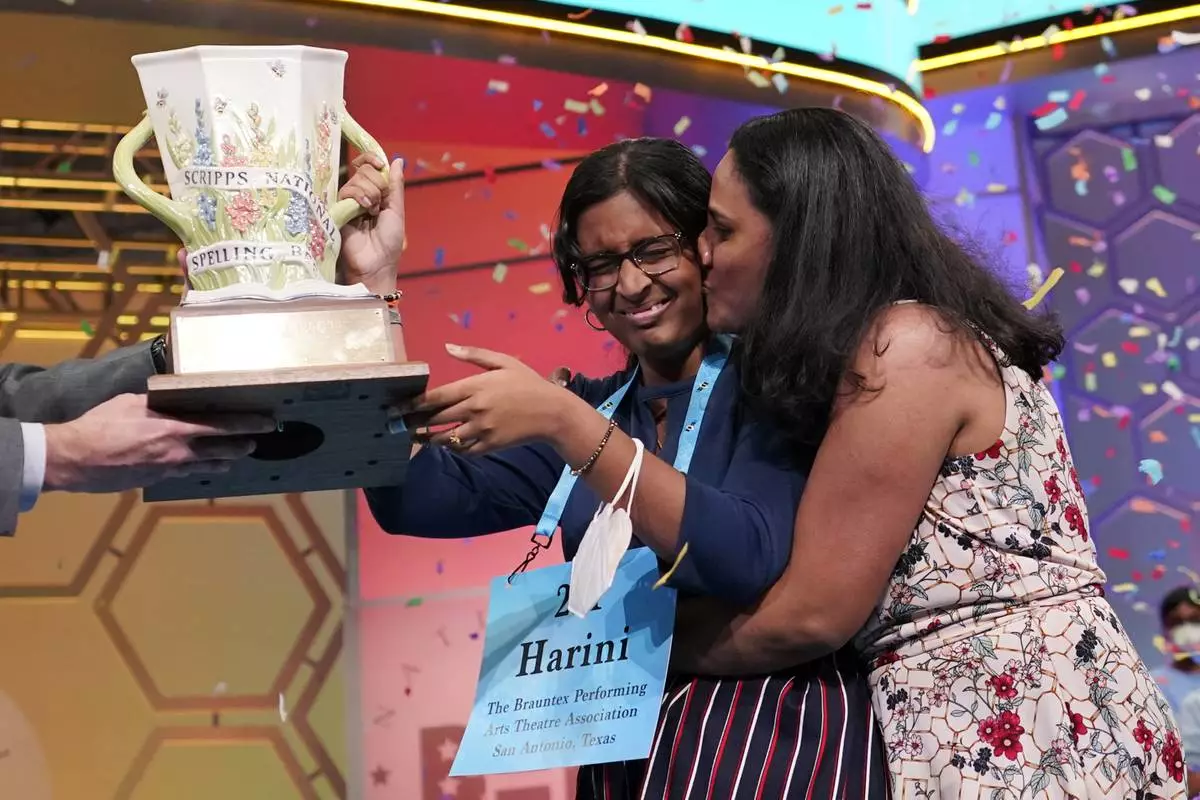
FILE - Harini Logan, 14, from San Antonio, Texas, gets a kiss from her mom Rampriya Logan on stage as she celebrates winning the Scripps National Spelling Bee, Thursday, June 2, 2022, in Oxon Hill, Md. Since 1999, 28 of the last 34 Scripps National Spelling bee champions have been Indian American. The experiences of first-generation Indian Americans and their spelling bee champion children illustrate the economic success and cultural impact of the nation’s second-largest immigrant group. (AP Photo/Alex Brandon, File)
SAN FRANCISCO (AP) — By adding Dennis Schroder, the Golden State Warriors believe they have found the perfect backcourt mate to complement Stephen Curry.
Curry can't wait to get going in what he expects to be a “seamless transition for him.”
“It can help me, it can help us,” Curry said. “What helps me helps us.”
Golden State landed Schroder in a trade with Brooklyn finalized Sunday that sends injured guard De’Anthony Melton and guard Reece Beekman to the Nets.
The Warriors are looking forward to seeing Schroder on both ends, attacking the basket and bringing a much-needed intense defensive dynamic.
“I just love his competitive nature, he's got that Dawg in him and you can kind of tell,” Curry said. “He doesn't talk that much but he's very animated and I've never not seen him in the moment trying to rip-your-head-off type vibe. I like that.”
Schroder is expected to join the team Monday to undergo his physical and have a couple of practices ahead of Thursday's game at Memphis.
“I’m thrilled. I told Dennis today he’s kicked my (butt) on three different continents,” Warriors coach Steve Kerr said. “You can’t beat ‘em, join ’em — ’22 playoffs I thought he was brilliant against us with the Lakers. Watching him in FIBA the last two summers, Philippines and we played them in London in an exhibition game. He’s a gamer, he’s a competitor, pick-and-roll player, two-way player.”
Kerr said he and his staff will discuss Schroder's role but considers him a likely starter considering “we've been changing our starting lineup almost nightly, searching.”
The trade was agreed to Saturday. League rules didn't allow the trade to become official until Sunday, when Melton's contract became eligible to be moved.
Also in the trade: a slew of second-round draft picks. Golden State will receive a second-rounder next year (a top-37-protected pick that originally belonged to Miami) and Brooklyn gets three second-rounders — in 2026 and 2028 (both via Atlanta) and Golden State's pick in 2029.
Schroder averaged 18.4 points and 6.6 assists this season for the Nets, who are 10th in the Eastern Conference. But the trade doesn't give them much in the way of on-court help this year: Melton is out for the remainder of the season while recovering from surgery to repair his left ACL.
“Losing Melt was a huge loss,” Kerr said. “I want to say thanks to De'Anthony and Reece Beekman for everything — their contributions, their commitment, their effort. It's always hard to trade guys and we wish them both well. But you've got to do what you've got to do to get better and this was a move that we felt made perfect sense, so he will fill what Melt was doing for us in terms of being able to play on or off the ball, excellent defender, long wingspan. He's a steals guy, forced turnovers, pace, everything that we need we feel like he can provide.”
Beekman scored two points in two appearances with Golden State this season.
The move gives the Warriors, who enter Sunday fifth in the Western Conference at 14-10, another shooter to pair alongside all-time 3-point leader Curry. Schroder is making 2.5 3-pointers per game this season and shooting 39% from beyond the arc — both career bests.
Golden State becomes Schroder's eighth team in 12 NBA seasons. He had stints with Atlanta, Oklahoma City, the Los Angeles Lakers, Boston, Toronto and Houston before joining the Nets. He also helped lead Germany to the 2023 Basketball World Cup title.
“It's a great pickup for the Warriors,” Dallas coach Jason Kidd said, “a veteran who understands how to win.”
AP Basketball Writer Tim Reynolds contributed to this story.
AP NBA: https://apnews.com/NBA
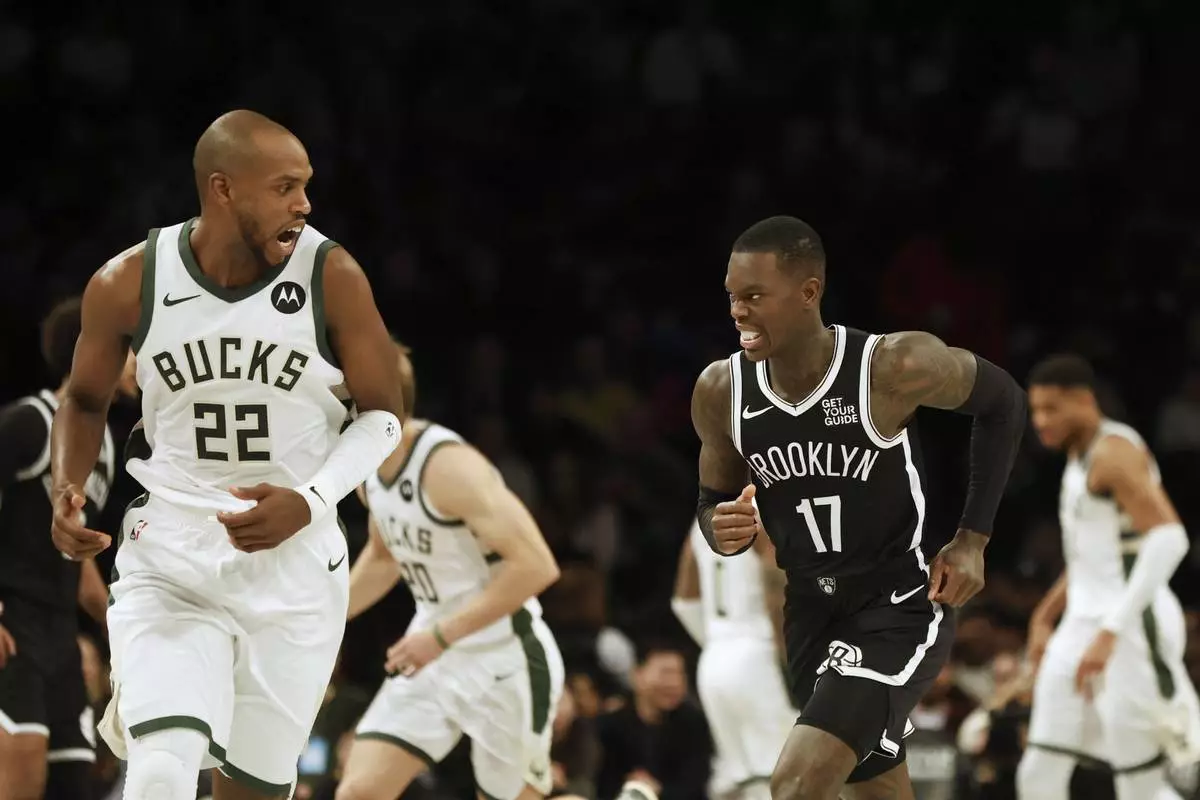
Brooklyn Nets' Dennis Schroder reacts after scoring during the first half of an NBA basketball game against the Milwaukee Bucks, Sunday, Dec. 8, 2024, in New York. (AP Photo/Heather Khalifa)
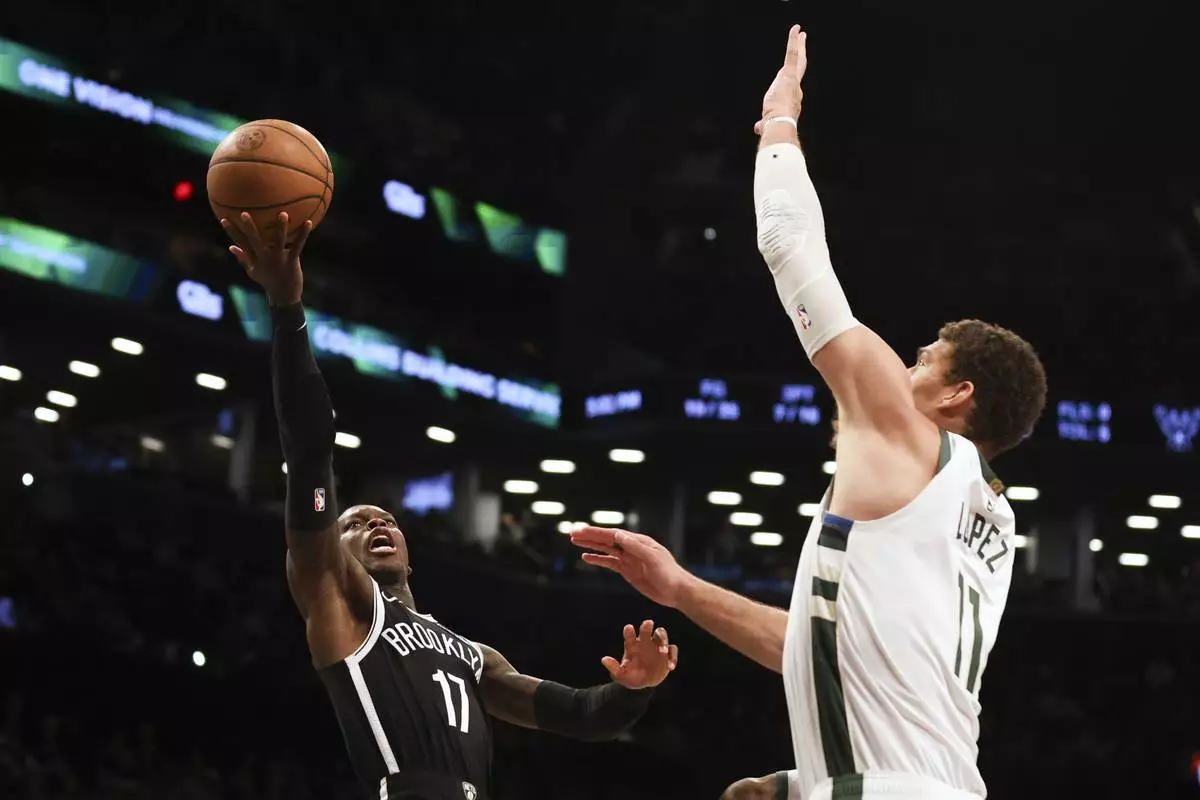
Brooklyn Nets' Dennis Schroder, left, looks to shoots over Milwaukee Bucks' Brook Lopez, right, during the second half of an NBA basketball game, Sunday, Dec. 8, 2024, in New York. (AP Photo/Heather Khalifa)







